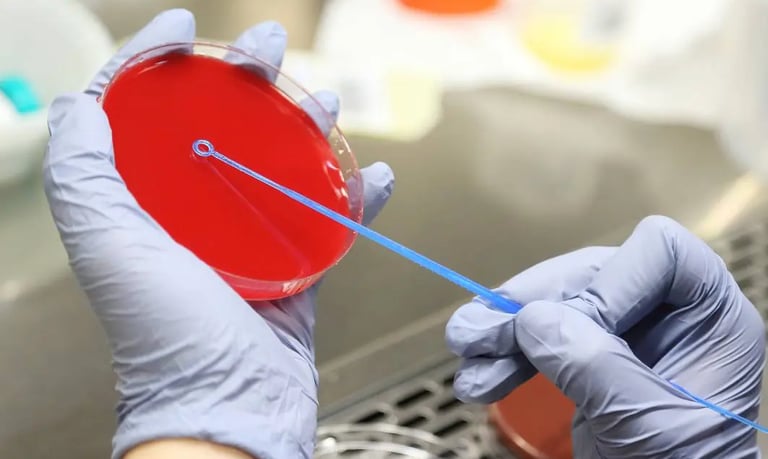AI-Powered Blood Testing: The Future of Preventive Health
BIOHACKING


For decades, blood tests have been a cornerstone of modern medicine, providing critical insights into everything from cholesterol levels to disease markers. But traditional testing has limitations—it’s often reactive rather than preventive, requires interpretation by human doctors, and lacks the ability to analyse complex health patterns over time.
Enter AI-powered blood testing—a game-changer in the world of preventive health. By combining advanced artificial intelligence with biomarker analysis, this technology is transforming the way we detect, predict, and prevent diseases. With faster results, personalised recommendations, and the ability to identify health risks long before symptoms appear, AI-driven blood testing is set to revolutionise healthcare.
So, how does it work, and what does it mean for the future of medicine? Let’s explore the science, the benefits, and the potential challenges of this emerging technology.
How AI is Transforming Blood Testing
Traditional blood testing involves measuring specific markers—such as glucose, cholesterol, or hormones—against established reference ranges. While this method is useful, it often provides a snapshot of health rather than a comprehensive, predictive analysis.
AI-powered blood testing goes beyond basic analysis by using machine learning algorithms to detect patterns, compare large datasets, and predict potential health issues based on subtle changes in biomarkers.
Key Technologies Behind AI Blood Testing
Machine Learning and Predictive Analytics
AI analyses large datasets of patient bloodwork, identifying trends that may signal early disease onset.
It can detect abnormalities that may be overlooked in traditional testing.
AI models become smarter over time, improving their accuracy as more data is collected.
Multi-Biomarker Analysis
Instead of looking at individual markers in isolation, AI considers multiple biomarkers simultaneously.
This holistic approach provides a deeper understanding of metabolic, immune, and hormonal health.
Personalised Health Insights
AI can assess individual risk factors based on genetics, lifestyle, and medical history.
Results are tailored to each person, providing custom health recommendations rather than generic advice.
Automated Pattern Recognition
AI can detect early warning signs of chronic diseases, such as diabetes, cardiovascular disease, and cancer, often before symptoms appear.
It can also identify hidden nutrient deficiencies, inflammation markers, and hormone imbalances.
The Benefits of AI-Powered Blood Testing
1. Early Disease Detection and Prevention
AI blood testing is redefining preventive healthcare by identifying risks before they develop into serious conditions.
Cardiovascular Disease: AI can detect subtle changes in inflammatory markers and lipid profiles, predicting heart disease risk earlier than traditional tests.
Diabetes: By analysing glucose trends over time, AI can detect insulin resistance years before a person is diagnosed with Type 2 diabetes.
Cancer Detection: Emerging AI-based blood tests can identify circulating tumour DNA (ctDNA), helping to detect cancer at its earliest, most treatable stage.
2. Faster and More Accurate Results
Traditional blood tests require human interpretation, which can lead to delays and errors.
AI-powered analysis is faster, more precise, and less prone to human bias.
Some AI systems can provide real-time insights, allowing doctors to act immediately on abnormal findings.
3. Personalised Health Monitoring
Instead of relying on one-size-fits-all lab ranges, AI tests consider individual baselines and track deviations over time.
This allows for highly personalised health recommendations, such as dietary changes, exercise adjustments, and targeted supplementation.
4. Reducing Healthcare Costs
Early detection means fewer hospital visits, fewer expensive treatments, and better long-term outcomes.
AI-driven preventive care has the potential to save billions in healthcare costs by reducing chronic disease burden.
Real-World Applications and Innovations
Several companies and research institutions are already pioneering AI blood testing for clinical use.
1. AI for Cancer Detection
Companies like Grail, Guardant Health, and Freenome are developing AI-powered liquid biopsies—blood tests that detect early-stage cancer by identifying genetic mutations or proteins linked to tumours.
Galleri by Grail claims to detect over 50 types of cancer from a single blood sample.
AI-powered cancer screening is being tested in hospitals and research labs, with early trials showing high accuracy rates.
2. AI in Cardiovascular Health
Startups like CardioAI and Cleerly use AI-driven blood tests to predict heart disease by analysing inflammatory markers, lipid profiles, and genetic risk factors.
These tests provide customised prevention plans, guiding patients toward dietary and lifestyle changes that reduce heart disease risk.
3. AI for Longevity and Anti-Ageing
Companies like InsideTracker and Thorne offer AI-powered wellness blood testing, focusing on biomarkers linked to ageing, metabolism, and cognitive health.
Users receive detailed longevity insights, along with personalised dietary, supplement, and exercise recommendations.
Potential Challenges and Ethical Concerns
Despite its promise, AI-powered blood testing raises several ethical and practical challenges.
1. Data Privacy and Security Risks
AI systems require large amounts of personal health data to function effectively.
Concerns over data breaches and misuse of genetic information remain a major issue.
Stronger data protection laws and encryption methods are needed to secure patient records.
2. Overdiagnosis and False Positives
AI can sometimes flag benign abnormalities as potential health risks, leading to unnecessary anxiety and medical procedures.
Improved algorithms and better training data are required to minimise false positives.
3. Accessibility and Cost
AI-powered blood testing is currently more expensive than standard blood tests.
Widespread adoption will depend on cost reduction, insurance coverage, and regulatory approval.
4. Regulatory and Ethical Challenges
AI-driven diagnostics must meet strict regulatory standards to ensure accuracy and reliability.
Ethical concerns exist around how AI should be used in medical decision-making—should AI assist doctors, or replace them entirely?
The Future of AI-Powered Blood Testing
AI-driven blood testing is still in its early stages, but its potential is undeniable. As technology advances, we can expect:
Mainstream adoption in hospitals and private healthcare settings.
More affordable and accessible AI-driven tests for preventive care.
Integration with wearable devices, providing continuous health monitoring.
AI-driven treatment recommendations, based on real-time biomarker data.
Ultimately, AI-powered blood testing could shift healthcare from a reactive model to a truly preventive system—where diseases are caught early, personalised interventions are available to all, and people can take proactive steps to optimise their long-term health.
Final Thoughts
The future of healthcare is not just about treating disease, but preventing it altogether—and AI-powered blood testing is one of the most exciting innovations in this space. By harnessing artificial intelligence, we can move towards a world where blood tests don’t just diagnose illness, but actively help people live healthier, longer lives.
As this technology continues to evolve, the question is no longer whether AI will transform blood testing, but how soon it will become a part of everyday healthcare.


